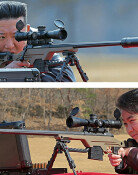U.S. State Department Interpreter Kim Dong-hyun to Retire in Late June
U.S. State Department Interpreter Kim Dong-hyun to Retire in Late June
Posted June. 22, 2005 06:00,
Interpreters are like a shadow. You should not tell your story. But I feel that I can tell my story now that Im free from the role.
Kim Dong-hyun (69), a Korean-American interpreter of the U.S. State Department who worked as an interpreter for his entire life, appeared before Korean correspondents based in Washington on June 20, prior to his retirement scheduled for late June. Perhaps because work ethics required him to keep confidential the conversations at numerous historic scenes, including the Korea-U.S. summits, his story that was not easy to start continued on and on.
Starting out as a student in the English literature department of Korea University, he has been engaged in interpretation for 49 years, or nearly half a century. He became an interpreter for the U.S. State Department in 1978 after going to the graduate school for International Relations of Johns Hopkins University in 1971. He worked as an interpreter for top U.S. officials, including four presidents, from Ronald Reagan to George W. Bush, vice presidents, secretaries of state and defense, and the speakers of the House of Representatives.
What is his assessment of Korea-U.S. alliance, as someone who listened directly to the conversations between leaders of the two countries?
Considering that the Korea-U.S. alliance suffered numerous ups and downs over the past six decades, the state of alliance is neither worse nor better. It is not in a crisis, as some argue. But Im not saying that it is better than ever, since bilateral misunderstandings were not perfectly resolved through the June 10 summit.
After pointing out crises that the alliance has faced from the era of confusion under the U.S. military administration to candlelight vigils in 2002, he said, The two countries should and can overcome, should there be another crisis.
With respect to recent pending issues over the two countries, he pointed out, The concepts of the balancer role, self-reliant diplomacy, and the strategic flexibility of U.S. forces in Korea should not be associated with anti- or pro-American debate. But the Korean governments lack of skill in presenting new perspectives gave rise to problems.
He is also an eyewitness to almost all the North Korea-U.S. talks and negotiations, from the 1994 Geneva negotiations to the 1999 Pyongyang visit of Special Envoy William Perry to the 2002 visit of Special Envoy James Kelly to the North. He has visited the North as many as 17 times since June 1991.
He recalled, The most impressive moment in my career as an interpreter was the talks between U.S. State of Secretary Madeleine Albright and the Supreme Commander of North Korean Armed Forces Kim Jong Il held in October 2000 in Pyongyang. I had a first-hand look at the talks, interpreting all the conversations there for 12 hours.
He commented on the relations between Pyongyang and Washington, saying, The biggest stumbling block is that both sides are not free from a rigid mindset, emphasizing that a practical approach is in order.
He also said, Former Korean presidents normally looked at the materials for summits worked out by aides during summit meetings. But I havent seen President Roh Moo-hyun look at such materials, maybe because hes young.
He added, President Kim Dae-jung was helped by materials, although he was a good speaker and logical. President Kim Young-sam was also good at delivering his governments position and what he had to say in his own style.
He went on to say, I remember that it was during President Rohs visit to the U.S. that I saw the most difficulties in the process of coordinating the content of bilateral agreements in my career as interpreter at bilateral summits.
Regarding President Bushs speaking style, Kim said, Straightforward and candid, he clarifies his position without confusing listeners. About the controversies over President Bushs addressing President Kim Dae-jung as this man and President Roh Moo-hyun as easy man, he explains that it was not intended to lower or be disrespectful of the Korean presidents, but just the matter of President Bushs speaking style.
Asked about his secret of being a fluent English speaker and good interpreter, as a Korean who even became an English interpreter of U.S. presidents, he gave an unexpected answer.
Although you make some mistakes in grammar, there will be no problem as long as you say at least the nouns and verbs in a loud and confident voice, since listeners will try to comprehend.
He mentioned as elements of a good interpreter language skills, enough expert knowledge to comprehend the content of what he or she interprets, and innate eloquence.
He said that he wants to be engaged in lectures, researches and writings in Korea for a year or two starting August, expressing that he wants to spend the rest of his life contributing to improving bilateral understandings based on his experience.
Soon-Taek Kwon maypole@donga.com







